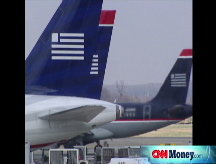Oil ends lower, in 4-day $16 selloff
Crude oil falls as traders focus on thawing U.S. Iran relations.
 |
| Oil prices remain more than 70% higher than they were a year ago. |
NEW YORK (CNNMoney.com) -- Oil prices fell Friday, marking a more than $16-a-barrel four-day drop, as the market focused on a possible thawing between U.S. and Iranian tensions.
Light, sweet crude for August delivery settled 41 cents lower at $128.88 a barrel. Prices had been higher for most of the session on Friday, reaching as high as $132.04 a barrel.
Oil fell $15.89 over the past three days as investor fears over tight supplies eased a bit.
Oil began falling Tuesday after Fed Chairman Bernanke said that high gas prices had begun to affect consumer demand. Government reports showing a surprise growth in oil, gasoline and natural gas supplies also contributed in this weeks price drop. On Friday, evidence thawing relations between the U.S. and Iran sent prices even lower.
Iran: Top U.S. administrator William Burns will meet this weekend with Iranian and European leaders in Geneva to discuss Iran's nuclear program.
Secretary of State Condoleeza Rice said Friday that sending Burns to Geneva on Saturday is a "strong signal" that the U.S. is open to diplomacy.
A report from U.K. newspaper The Guardian on Thursday said that the U.S. may announce a diplomatic interest section based in Tehran in less than a month.
"With this meeting and potential embassy outlook setup, I think we're seeing some of [oil's] geopolitical premium being extracted," said John Kilduff, energy analyst with MF Global in New York.
Concern that a conflict with Iran, the second largest oil producing member of OPEC, might disrupt that country's crude supply has been one of the major forces pushing oil prices higher over the past few weeks.
"If things look good over the weekend, there's a good chance we could sell off on Monday," said Phil Flynn, senior market analyst with Alaron Trading in Chicago.
Trading play: Oil's three-day price drop has encouraged a lot of investors to enter the market early in the day, according to Neal Dingmann, senior energy analyst at Dahlman Rose & Co.
They will probably buy and hold oil as they look ahead to the weekend diplomatic talks with Iran, said Dingmann.
"The real key is going to be how [oil] goes out at the end of the day," said Dingmann.
World economy: The International Monetary Fund reported Friday that the world economy had improved over the last few months, leading some to think oil may have fallen too quickly this week.
The IMF raised its forecast for 2008 to 4.1% from the 3.7% estimated growth in April. It also increased growth projections for 2009 to 3.9%.
The report "has been making people think that they may have been overly pessimistic," said Rachel Ziemba, energy analyst with RGE Monitor.
Nigerian pipeline: Investors were also taking into account a pipeline explosion in the Nigerian state of Bayelsa on Thursday. Pipeline owner Eni SpA, an Italian energy giant, said it had to shut down pipelines that carry 47,000 barrels a day due to a "sudden drop of pressure."
"I can confirm that there was an explosion, but we don't yet know if the pipeline was vandalized or if it was an accident," said Col. Chris Musa, the head of the Bayelsa State military in an Associated Press report.
Attacks on Nigeria's oil infrastructure over the past several years have cut oil output by almost a quarter.
Brazil: Supply concerns from Brazil appeared to be easing.
An oil strike in Brazil drew to a close as oil workers said late Thursday they would end a five-day strike against state-owned oil company Petrobras as scheduled. However they warned they may call another strike next month.
A statement from Petrobras said the strike had not affected production in the Campos Basin, a region which accounts for nearly 80% of Brazil's oil output. ![]()



